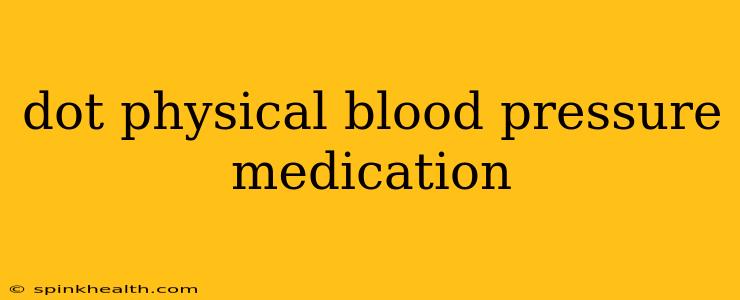The rumble of the big rig, the open road, the freedom of the life of a truck driver – it’s a dream for many. But before you can hit the highway, there’s a crucial hurdle: the Department of Transportation (DOT) physical. This comprehensive exam ensures you're fit to operate a commercial motor vehicle, and blood pressure often plays a starring, sometimes stressful, role. Let's unpack everything you need to know about blood pressure, medication, and your DOT physical.
My name is Alex, and for over 15 years, I’ve worked alongside truck drivers, guiding them through the DOT physical process. I've seen firsthand the anxieties surrounding blood pressure and its impact on obtaining a medical examiner's certificate. This guide is based on my experience and aims to clarify the process for you.
What Blood Pressure Readings Disqualify You From a DOT Physical?
This is often the first question on many drivers' minds. The DOT doesn't have a single magic number. Instead, they follow the guidelines set by the Federal Motor Carrier Safety Administration (FMCSA). Generally, a single high reading isn't an automatic disqualification. However, consistently elevated blood pressure, particularly hypertension (high blood pressure), can lead to a denial. The medical examiner will consider your entire medical history, including your current medication and recent readings.
How is Blood Pressure Measured During a DOT Physical?
The process is straightforward. The medical examiner will use a sphygmomanometer (the familiar inflatable cuff) to measure your systolic (the top number) and diastolic (the bottom number) blood pressure. They'll take multiple readings to ensure accuracy.
Can I Take Blood Pressure Medication Before My DOT Physical?
This is a tricky one, and the answer is: it depends. Do not stop taking your prescribed blood pressure medication without consulting your doctor. Suddenly stopping medication can be dangerous and can lead to a hypertensive crisis.
The best approach is to discuss your medication with your doctor well in advance of your DOT physical. They can advise you on the best course of action, which might include:
- Continuing your medication as prescribed: This is often the safest option, allowing the examiner to assess your blood pressure while you're on a stable medication regimen.
- Adjusting your medication: Your doctor may adjust your dosage to optimize your blood pressure before the exam.
- Providing documentation: Your doctor can provide the medical examiner with documentation outlining your treatment plan and blood pressure history.
What Happens If My Blood Pressure is High During My DOT Physical?
If your blood pressure is elevated during the exam, the medical examiner will likely take additional readings. They may also ask about your medical history, lifestyle, and current medications. Depending on the severity and pattern of your high blood pressure, they might:
- Request further testing: This could involve additional blood tests or an electrocardiogram (ECG).
- Recommend follow-up with your doctor: The examiner may defer the decision until your doctor can provide more information.
- Issue a medical examiner's certificate with restrictions: In some cases, you might receive a certificate, but with limitations on your driving hours or the types of vehicles you can operate.
- Not issue a medical examiner's certificate: If your blood pressure is severely elevated and uncontrolled, they may not issue a certificate.
What if I'm on Blood Pressure Medication and Need a DOT Physical?
The key here is open communication. Be completely transparent with your medical examiner about your medications, dosages, and any relevant medical history. Bringing your medical records, including blood pressure readings from recent doctor's visits, can significantly streamline the process. Remember, the medical examiner is there to ensure your safety and the safety of others on the road.
How Can I Lower My Blood Pressure Naturally?
While medication plays a crucial role for many, lifestyle changes can significantly impact blood pressure. These include:
- Regular exercise: Aim for at least 30 minutes of moderate-intensity exercise most days of the week.
- Healthy diet: Focus on fruits, vegetables, whole grains, and lean protein. Limit sodium, saturated fats, and processed foods.
- Stress management: Practice relaxation techniques like yoga, meditation, or deep breathing exercises.
- Weight management: Maintaining a healthy weight can significantly lower blood pressure.
- Limit alcohol: Excessive alcohol consumption can raise blood pressure.
Navigating the DOT physical process with blood pressure medication can seem daunting, but with proactive planning and open communication with your doctor and medical examiner, you can successfully obtain your medical examiner's certificate and hit the road. Remember, prioritizing your health is key, both for your own well-being and the safety of others.

